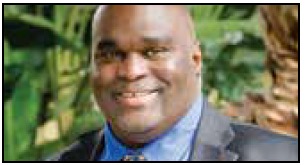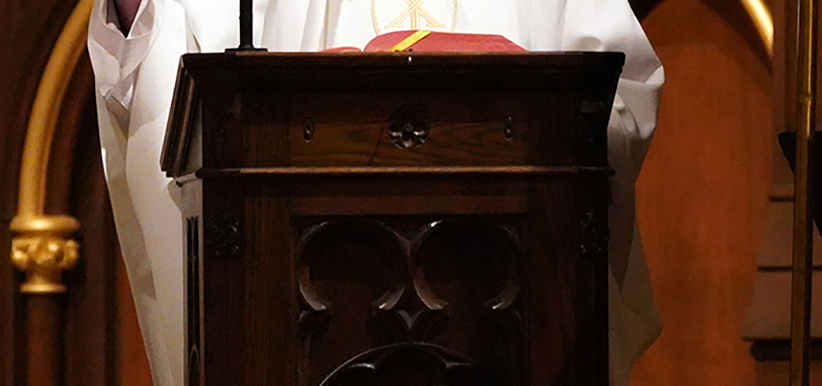Deacon’s Role in Liturgical Preaching Outside of Mass
Distinguishing between the homily at Mass and preaching at a liturgical service
Deacon Harold Burke-Sivers Comments Off on Deacon’s Role in Liturgical Preaching Outside of Mass
 One of the most anticipated duties that a deacon exercises upon ordination is liturgical preaching. During formation, while listening to homilies in the pew, we may have said to ourselves, “I can’t wait to get ordained so I can preach on [insert your favorite Gospel reading here].” However, to understand properly how the deacon functions as a preacher, we must distinguish between giving the homily at Mass and preaching at liturgical services.
One of the most anticipated duties that a deacon exercises upon ordination is liturgical preaching. During formation, while listening to homilies in the pew, we may have said to ourselves, “I can’t wait to get ordained so I can preach on [insert your favorite Gospel reading here].” However, to understand properly how the deacon functions as a preacher, we must distinguish between giving the homily at Mass and preaching at liturgical services.
The Code of Canon law is quite helpful here. “Presbyters and deacons possess the faculty of preaching everywhere … unless the competent authority has restricted or taken away the faculty” (Canon 764). The deacon, then, has the faculty, which is the performance of ministry granted or permitted by the bishop or ordinary, and not the right to preach. Preaching includes “those things which one must believe and do for the glory of God and the salvation of humanity, … the doctrine which the magisterium of the Church sets forth concerning the dignity and freedom of the human person, the unity and stability of the family and its duties, the obligations which people have from being joined together in society, and the ordering of temporal affairs according to the plan established by God” (Canon 768).
The homily at Mass is a type of preaching that the deacon can do. “Among the forms of preaching, the homily, which is part of the liturgy itself and is reserved to a priest or deacon, is preeminent” (Canon 767). Regarding the specific faculty of deacons preaching at Mass, the General Instruction of the Roman Missal (GIRM) makes a further clarification: “The homily should ordinarily be given by the priest celebrant himself … or occasionally, according to circumstances, to the deacon, but never to a lay person” (No. 66).
At first glance, the Code of Canon Law and the GIRM appear to be in conflict. They state that the deacon has the faculty to preach everywhere, emphasize the importance of preaching in the life of the Church, but then “limits” the deacon’s ability to preach at Mass. This tension is resolved, however, when it is understood that the deacon’s primary responsibility for liturgical preaching is outside of Mass. “When the deacon presides at a liturgical celebration … he shall give due importance to the homily, since it ‘proclaims the marvels worked by God in the mystery of Christ, present and effective in the liturgical celebrations’” (Congregation for the Clergy, Directory for the Ministry and Life of Permanent Deacons, No. 25).
According to Bishop Alexander K. Sample, at the time bishop of Marquette, Mich., “Preaching, taken in its strictly liturgical sense, also involves much more than simply the homily at Mass. The permanent deacon has the opportunity to preach in various liturgical and ecclesial contexts. These include, but are not limited to: wake services, the funeral liturgy outside of Mass, baptisms, wedding celebrations outside of Mass, liturgies of the Word outside of Mass, Sunday celebrations in the absence of a priest, during the Liturgy of the Hours, [Eucharistic adoration with Benediction] and other prayer and liturgical services” (The Deacon: Icon of Christ the Servant, Pastoral Letter, Section VI).
Care for the People of God in the parish (the sheep) is the primary responsibility of the priest (the shepherd), especially when the sheep are being fed at the Mass. Outside the context of Mass, deacons act as the sheepdogs. Our responsibility is to gather those in the flock who are scattered and lost (the “nones,” the uncatechized, the fallen away, the unbeliever, those questioning and confused about the Catholic faith) and bring them to the shepherd, to the healing ministry of the priesthood.
The deacon assists the bishop with his ministry of evangelization as evidenced by the fact that, even though he does not preach at Mass frequently, the deacon proclaims the Gospel at every Mass. As a permanent, sacramental sign of the Church’s mission of service to the world, the deacon goes forth from the liturgy and brings the Good News of the encounter with Jesus Christ to those who are not only outside of Mass but also outside of the Church. “The permanent deacon should pay careful attention to the other opportunities he has to preach at liturgical services and in the course of his daily living in witness to Christ and the teachings of the Church,” Bishop Sample wrote. The preaching ministry of the deacon is a compass that God uses for those searching for an intimate, personal, loving and life-giving relationship with the living God.
DEACON HAROLD BURKE-SIVERS serves at Immaculate Heart of Mary Catholic Church in Portland, Oregon.





